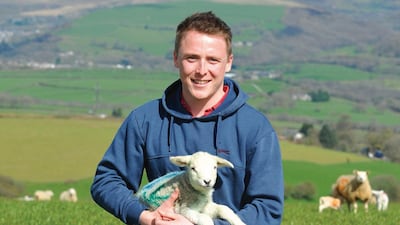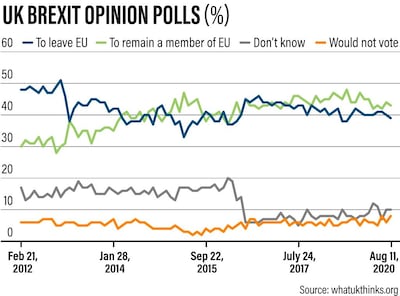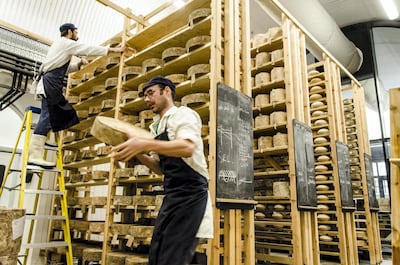Sitting on top of the historic South Wales Coalfield is the Anthony family’s farm. Home to 1,000 sheep and 300 cattle, it has been in their name since 1926. Almost all their produce is sold to European Union countries and while they voted for Brexit remorse has set in as the threat to their livelihood grows.
Years of frustration and a feeling of being abandoned by politicians led the Anthonys to their 'leave' vote in June 2016. With just weeks before the end of the transition period, when Britain loses its trade access to the bloc on December 31, the realities are starting to hit home.
"Our attitude has changed," Mr Anthony told The National. "We have gone from being very optimistic to being cautiously optimistic. We saw Brexit as a once-in-a-lifetime opportunity for change – farming needed change – but over the last four years we haven't been on the road to getting what we were promised. We didn't vote for a cliff-edge Brexit, we wanted a longer transition period so trade deals could be sorted out."
The 27-year-old’s grandfather David voted for the UK to stay in the European Economic Community in an earlier referendum in 1975, but over the years confidence in Brussels to deliver for Welsh farmers diminished and he became a Brexiteer.
“In 1975 my grandfather wanted it to be easier for Welsh farmers to trade with Europe and even though trade opened up, he felt farmers were being micromanaged by the EU and he didn’t like that.”
Tariffs and other regulations affecting agriculture are among the most formidable barriers to trade that the EU mounts against outside countries. The shift from inside to outside the bloc will be felt hardest by a sector that had developed a reputation for quality through decades of investment by families and small-scale corporations. On the farm near Bridgend in south Wales, the Anthonys fear a painful choice looms, such as reducing their lamb business because of lost markets that can’t easily be replaced elsewhere in the world.
Brexit talks have been defined by so-called “crunch weeks,” but negotiations in Brussels this week are important due to their proximity to that impending deadline of December 31. If a deal cannot be reached within days, anything that is eventually agreed cannot be ratified by both the EU and UK parliaments in time for December 31, and trade between the EU and UK will default to World Trade Organisation rules. That would have a significant effect on British businesses.
While they were prepared for change in 2021, due to Covid-19 and Brexit, many business owners are concerned about the lack of assurances been given by the government in relation to plans for January 1.
"One thing we are clear about is that we will not have goods in transit on January 1 due to the uncertainty," David Lockwood, managing director of cheese specialist Neal's Yard Dairy, told The National.
“That is why we are going to send a little extra [to Europe] at the end of December and sit back a little at the beginning of January and see how things play out,” he said.
The dairy was established in central London in 1979 as an urban cheesemaker, and quickly established an export business with Europe being a major customer.
“Export is a big part of our sales. We export a lot of cheddar and stilton and we have a lot of uncertainty about where that business will go after Brexit,” Mr Lockwood said.
“We also import a fair bit of Irish cheese, and Parmesan is our main European import, and we are worried about how much the costs will change due to tariffs. Even if tariffs hit us only one way, it will still affect how we do business.”
The dairy employs 75 people, and despite seeing an uptick in online sales over the past few months, the business has been hit by the coronavirus pandemic.
England entered into its second lockdown last week, dealing a blow to businesses across the country.
Andrew Goodacre, chief executive of the British Independent Retailers Association, believes this, coupled with potential disruption to supply chains due to Brexit, will be enough to shut shops across the country.
“Many retailers don’t think they will survive past December because of this lockdown in November, which usually brings in 25 per cent more sales than any other month. So if you have had your biggest month taken away from you, and Christmas is approaching, you aren’t thinking about Brexit, because it won’t be as detrimental as this lockdown.”
Back in Wales, Mr Anthony agrees that the lack of clear guidance from the government has caused worry among the community.
“You can say ‘Brexit-proof your business’, but this government always changes its mind on what it’s going to do. So if the plan changes, then you could potentially lose the value of that investment in your business. Many farmers can’t afford for that to happen”.




